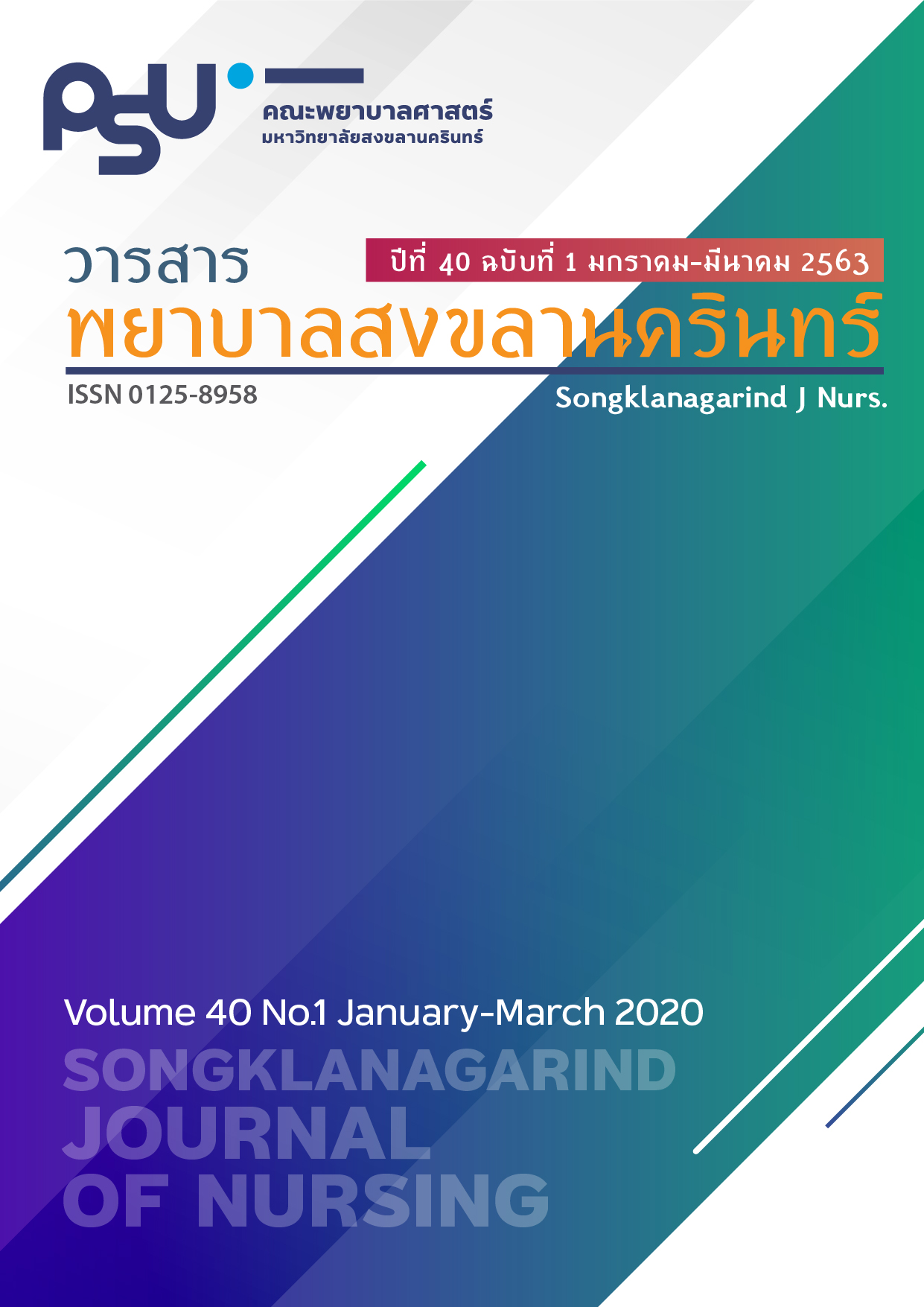Prenatal Attachment Among Thai Pregnant Adolescents: A Qualitative Study
Main Article Content
Abstract
Prenatal attachment positively influences maternal-fetal health and the well-being of the child after birth. However, seldom are studies describing prenatal attachment among Thai pregnant adolescents found. This study aimed to explore the composition of prenatal attachment among Thai pregnant adolescents. A qualitative approach was employed. Thirteen in-depth interviews and a focus group interview (n = 3) were conducted with Thai pregnant adolescents, 15 – 19 years of age, attending routine care at the antenatal care (ANC) clinic between September 2016 and January 2017. Data were transcribed verbatim and analyzed using a content analysis method.
Three categories emerged from the data: cognitive attachment, affective attachment, and behavioral attachment. Cognitive attachment consisted of ‘accepting the baby’, ‘being curious and imagining the baby’, ‘being concerned about the baby’s health’, and ‘wanting to be a good mother’. Affective attachment consisted of ‘feeling glad to have the baby’, ‘loving, attaching, and ‘having a sense of ownership’, and ‘feeling connected to the baby’. Behavioral attachment consisted of ‘communicating and interacting with the baby’, ‘taking good care of self for the well-being of the baby’, and ‘preparing for the baby’s arrival’. These findings provide a better understanding of the composition of prenatal attachment among Thai pregnant adolescents.
Article Details
References
World Health Organization. Adolescent pregnancy fact sheet [Internet]; 2018 [cited 2018 Feb 23]. Available from: https://www.who.int/news-room/fact-sheets/detail/adolescent-pregnancy
World Health Organization. WHO country cooperation strategy Thailand 2017-2021. Thailand: WHO Country Office for Thailand; 2017.
Isaranurug S, Mo-suwan L, Choprapawan C. Difference in socio-economic status, service utilization, and pregnancy outcomes between teenage and adult mothers. J Med Assoc Thai. 2006; 89(2): 145-51.
Sa-ngiamsak P. The life experiences of unmarried teenage mothers in Thailand [dissertation]. [Queensland]: The University of Queensland; 2016. 204 p.
Neamsakul W. Unintended Thai adolescent pregnancy: A grounded theory study [dissertation]. [San Francisco]: University of California; 2008. 319 p.
UNICEF. Situation analysis of adolescent pregnancy in Thailand: Synthesis report 2015. Bangkok: UNICEF Thailand; 2015.
Rowe HJ, Wynter KH, Steele A, et al. The growth of maternal-fetal emotional attachment in pregnant adolescents: A prospective cohort study. J Pediatr Adolesc Gynecol. 2013; 26(6): 327-33.
Flaherty SC, Sadler LS. A review of attachment theory in the context of adolescent parenting. J Pediatr Health Care. 2011; 25(2): 114-21. doi:10.1016/j.pedhc.2010.02.005
Pantumas S, Kittipichai W, Pitikultang S, et al. Self-care behaviors among Thai primigravida teenagers. Global J Health Sci. 2012; 4(3): 139-47. doi:10.5539/gjhs.v4n3p139
Liabsuetrakul T. Trends of teenage pregnancy and pregnancy outcomes. Thai J Obstet Gynaecol. 2012; 20(4): 162-5.
Thaithae S, Thato R. Obstetric and perinatal outcomes of teenage pregnancies in Thailand. J Pediatr Adolesc Gynecol. 2011; 24(6): 342-6. https://doi.org/10.1016/j.jpag.2011.02.009
Alhusen JL, Gross D, Hayat MJ, et al. The influence of maternal- fetal attachment and health practices on neonatal outcomes in lowincome, urban women. Res Nurs Health. 2012; 35(2): 112-20. https://doi.org/10.1002/nur.21464.
Ross E. Maternal-fetal attachment and engagement with antenatal advice. Br J Midwifery. 2012; 20(8): 566-75.
Alhusen JL. A literature update on maternalfetal attachment. J Obstet Gynecol Neonatal Nurs. 2008; 37(3): 315-28. doi:10.1111/j.1552-6909.2008.00241.x
Cannella BL. Maternal-fetal attachment: An integrative review. J Adv Nurs. 2005; 50(1): 60-8. https://doi.org/10.1111/j.1365-2648.2004.03349.x.
Yarcheski A, Mahon NE, Yarcheski TJ, et al. A meta-analytic study of predictors of maternalfetal attachment. Int J Nurs Stud. 2009; 46(5): 708-15. https://doi.org/10.1016/j.ijnurstu.2008.10.013.
Brandon AR, Pitts S, Denton WH, et al. A history of the theory of prenatal attachment. J Prenat Perinat Psychol Health. 2009; 23(4):201-22.
Walsh J, Hepper EG, Marshall B. Investigating attachment, caregiving, and mental health: A model of maternal-fetal relationships. BMC Pregnancy Childbirth, 2014; 14: 383-92. doi:10.1186/s12884-014-0383-1.
Delahoussaye CP. A grounded theory approach to the discovery of adolescents’ relationship with their unborn child [dissertation]. [New Orleans]: Louisiana State University; 1994. 103 p.
Olivier L. Maternal fetal attachment during teenage pregnancy [master’s thesis]. [Somerrest West]: Stelienbosch University; 2016. 200 p.
Leva-Giroux RA. Prenatal attachment: The lived experience [dissertation]. [San Diego]: University of San Diego; 2002. 185 p.
Diniz E, Volling BL, Koller SH. Social support moderate association between depression and maternal-fetal attachment among pregnant Brazilian adolescents. J Reprod Infant Psychol. 2014; 32(4): 400-11.
doi: https://doi.org/10.1080/02646838.2014.910865
Bielawska-Batorowitcz E, Siddiqui A. A study of prenatal attachment with Swedish and Polish expectant mothers. J Reprod Infant Psychol. 2008; 26(4): 373-84. doi:10.1080/02646830802426144.
Streubert HJ, Carpenter DR. Qualitative research in nursing: Advancing the humanistic imperative. 5th ed. Philadelphia: Lippincott Williams & Wilkins; 2011.
Polit DF, Beck CT. Essential of nursing research: Appraising evidence for nursing practice. 8th ed. Philadelphia: Lippincott Williams & Wilkins; 2014.
Shieh C, Kravitz M, Wang HH. What do we know about maternal-fetal attachment? Kaohsiung J Med Sci. 2001; 17(9): 448-54.
Rubin R. Maternal identity and the maternal experience. New York: Springer Publisher;1984.
Bloom KC. The development of attachment behaviors in pregnant adolescents. Nurs Res. 1995; 44(5): 284-9.
https://doi.org/10.1097/00006199-199509000-00005.
Sherer S, Radzik M. Psychosocial development in normal adolescents and young adults. In: Neinstein LS, editor. Neinstein’s adolescent and young adult health care: A practical guide. 6th ed. Philadelphia: Wolters Kluwer; 2016. p. 38-42.
Ji ES, Han HR. The effects of Qi exercise on maternal-fetal interaction and maternal wellbeing during pregnancy. JOGNN. 2010; 39(3): 310-8. doi:10.1111/j.1552-6909.2010.01135.x.


